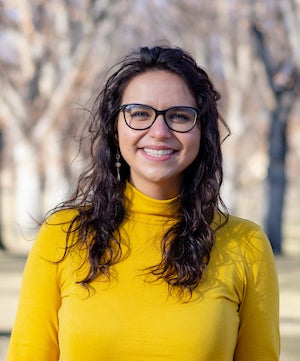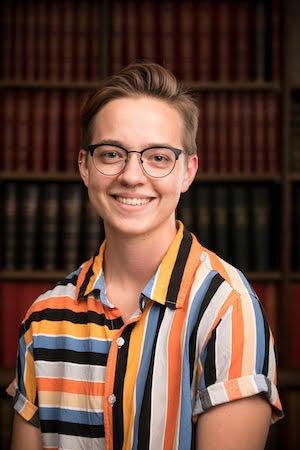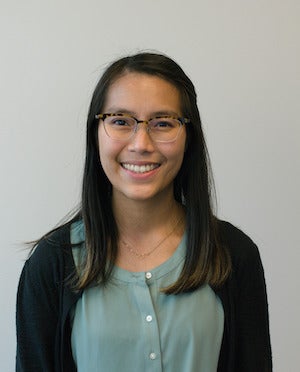2021 cohort of UCAR Next Generation Fellows announced
Earth system science students from underrepresented communities selected for prestigious UCAR program
Sep 23, 2021 - by Ali Branscombe
The NSF NCAR Mesa Lab, Fleischmann building, and Mesa Lab Road will be closed through Friday, Dec. 27, due to nearby water leak and repairs.
View more information.Sep 23, 2021 - by Ali Branscombe
Three new students have been selected by the University Corporation for Atmospheric Research (UCAR) for the Next Generation Fellowship, an opportunity that gives financial and academic support to Earth system science students from historically underrepresented groups. The 2021 cohort consists of Julieta F. Juncosa Calahorrano, Earth system science fellow; Liz Cunningham, diversity and inclusion fellow; and To-Nhu “Leslie” Nguyen, public policy fellow.
“I am pleased to welcome this year’s cohort of fellows,” said UCAR President Antonio Busalacchi. “As we move into the fifth year of the UCAR Next Generation Fellowship, I am proud to witness how each cohort brings their unique passion and vision to our organization and the greater Earth system science community. Our field benefits greatly from the diverse perspectives and experiences of these rising scientists, and I look forward to seeing what the 2021 fellows will accomplish.”
UCAR will support the three fellows with two years of graduate school funding. The fellows will also receive professional development and experience through summer internships with UCAR and the National Center for Atmospheric Research (NCAR), which is managed by UCAR on behalf of the National Science Foundation.

Julieta F. Juncosa Calahorrano — Earth system science fellow
Colorado State University
In her home of Quito, Ecuador, Juncosa Calahorrano was inspired to study environmental engineering as a solution to pollution of the local water and atmosphere. Her goal has been to better understand the processes that lead to pollution of natural systems and the ways informed policies can improve ecosystem and societal well-being. In particular, she was drawn to study air quality and atmospheric science. Juncosa Calahorrano earned her bachelor’s degree in environmental engineering from Universidad San Francisco de Quito, and a master’s degree in atmospheric science from Colorado State University (CSU). Now Juncosa Calahorrano is working toward her doctorate at CSU, where her research focuses on investigating the impacts and effects of reactive nitrogen in the atmosphere from wildfire smoke plumes and concentrated animal feeding operations. Her career goals are to be a professor and mentor the next generation of rising scientists while also making the atmospheric chemistry research in Latin America more globally visible.
During her fellowship, Juncosa Calahorrano will be utilizing the expertise and resources available at NCAR’s atmospheric chemistry laboratory for instrumentation testing and modeling capabilities.
“This fellowship will allow me to learn from a group of world-class scientists specializing in both atmospheric chemistry instrumentation and regional modeling,” said Juncosa Calahorrano. “Our goal is to develop a new technique that will better measure oxidized nitrogen, as well as incorporate measurements from a recent field campaign into an atmospheric chemistry model. This will ultimately help improve our knowledge of the impacts of reactive nitrogen.”

Liz Cunningham — Diversity and Inclusion Fellow
University of Toronto
Cunningham is a doctoral student in physics at the University of Toronto with a specialization in environmental studies. Along with their research and studies, Cunningham has co-founded a student organization focused on bringing visibility and awareness to the challenges of underrepresented groups within the physics field. Cunningham points to their lived experience as a queer and nonbinary scientist as their reason for working to promote diversity, equity, and inclusion in science.
“I am hoping that part of my role will be as a visible queer, trans, and disabled scientist that others who share similar identities can look to as an example of someone like themselves being open in science,” said Cunningham. During their time as a fellow, Cunningham will work closely with UCAR’s Office of Diversity, Equity, and Inclusion to enact workplace policies and projects that will help make the Earth system science field a welcoming place for people in underrepresented groups.
Cunningham views the UCAR fellowship as an opportunity to gain practical experience applying initiatives within a professional workplace setting. “I would like to work on improving, growing, or developing outreach projects run by UCAR for underrepresented communities,” said Cunningham. Cunningham holds a master’s degree in physics from Loyola University Chicago where they also earned the Father Gerst Memorial Award for their high academic performance in the physics department.

To-Nhu “Leslie” Nguyen — Public Policy Fellow
University of Washington
Nguyen was working as an air quality consultant based in her hometown of Houston, Texas, when Hurricane Harvey made landfall and destroyed her childhood home. As an air quality expert, Nguyen had already witnessed firsthand how public policies impact human health and welfare, but she points to Harvey as being a turning point in her career. After that event, Nguyen was inspired to return to school and study how implementing technical solutions can help protect the future of the planet against climate change impacts. “Hurricane Harvey catalyzed my interest in the ocean, and I looked for ways to explore marine affairs in my job,” said Nguyen.
Now Nguyen is pursuing a master’s degree in marine affairs at the University of Washington and hopes to use her professional and personal experiences to design policies that will help coastal communities build resilience against extreme weather events. “My past experiences have helped me gain a better understanding of environmental regulations and the impacts of human activities on our planet,” said Nguyen. “The Next Generation Fellowship will provide first-hand experience on how scientific policy and advocacy work in the real world.”
Nguyen’s public policy fellowship will bring her to work with UCAR staff in Washington, D.C., where she will learn how to help translate scientific research and knowledge into applicable policies. Nguyen holds a bachelor’s degree in chemical and biomolecular engineering from Rice University and received a regional award for her participation in the Society of Women Engineers in 2014.